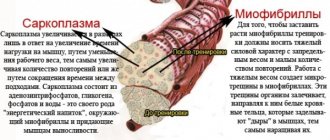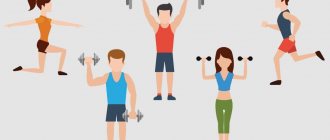Source: physiqonomics.com Translation: Alexey Republicommando
This article was published on the Zozhnik website, 10/31/2017.
So, last time I revealed the secret why you are not losing weight: you eat too much. Today we’ll take the next step and figure out why you’re not losing weight even with a calorie deficit.
Calorie intake is one part of the equation. And the other is expense.
And if with the receipt everything is very simple (you eat food and that’s it), then with the consumption it is more complicated.
Our body is great at maintaining weight and is happy when we gain weight. And vice versa - he doesn’t like getting rid of valuable fat reserves. Here are 8 reasons why we don’t lose weight even at a deficit (and what to do about it all).
You don't have enough patience
It's the same thing all the time:
– I went on a diet, but it doesn’t help. – How long have you been on this diet? - Four whole days! - Four days? - Yes, four days! The diet doesn't work! (Aadam shoots himself)
Yes, yes, most people fail to lose weight for this simple reason: they are too impatient. I’ll explain it on the graph:
When you start a diet and see the first changes for the better, you begin to feel dizzy with success. You think that it will continue to be just as easy, motivation is through the roof. But this is a misconception: you soon move into the next phase, which I call “Sucks” - you do everything right, but there are no more changes.
This is where many people run out of patience and their diet breaks down. But if you had held out longer, progress would have resumed:
Solution: weight loss CANNOT be forced. You can only hold a deficit, train and wait.
So first of all, calm down and be patient. You didn’t get fat in a week and you won’t lose weight in a week either. I will say more, people who count on the help of a “quick diet” most often gain back everything they lost. They simply cannot withstand too much restriction for long enough and do not develop healthy habits that will help them maintain a healthy weight in the future.
What speed of weight loss should I expect? Depends on the amount of excess fat: the more, the faster it will go away. However, if you are already relatively thin when you start the diet, you may need to lose weight more slowly to maintain muscle and strength.
So aim to lose 0.5-1% (of your total weight) per week. A person weighing 110 kg can lose 0.55-1.1 kg per week, while a person weighing 70 kg should lose 350-700 grams.
Question 3: “I lost weight on... a diet, but then I gained even more, is the diet not working?”
Answer:
first of all, nutritionists are against diets! Diets remain only for the treatment of patients in hospitals. Secondly, the vast majority of people are helped to create a slim and healthy body simply by a balanced, rational, varied diet! If you lose weight and then gain weight again, then you are definitely doing something wrong! In dietetics, this is called “yo-yo syndrome,” when after too much calorie restriction (eating 500-700 kcal per day), a person switches to a regular diet and gains even more weight than he originally had. Contact a nutritionist, do a body composition analysis (bioimpedance) and choose the right diet based on calories and the composition of proteins, fats and carbohydrates.
1b. You compare yourself to others
A friend lost weight - what kind of diet is he on? Another one came to the fore - what is his program?
I can't stop you from looking at others and being jealous (we all do it), but understand this important thing: the more you try other people's diets and programs, the less likely you are to succeed yourself. They may have completely different conditions, such as better genetics, or use illegal drugs, or have been training every day for the last 20 years.
Solution: Seek information and ask questions. Don't be afraid to try new things, but once you choose one, dedicate plenty of time to it. In short, patience.
Cushing's syndrome and body fat
Cushing's syndrome is a set of clinical symptoms caused by an excess of glucocorticosteroids, one of the hormones produced by the adrenal glands. This occurs when a patient takes too many corticosteroids or when autonomic tumors form in the adrenal cortex and secrete too much of the hormone. These types of changes are also more common in women.
Patients with Cushing's syndrome are obese with a characteristic distribution of adipose tissue predominantly in the trunk and neck, while the limbs remain slender. They also develop unsightly red-brown stretch marks around their abdomen, thighs, and buttocks. Patients with Cushing's syndrome also have a characteristic round, moon-shaped face.
As a result of Cushing's syndrome, the patient may develop serious diseases such as diabetes, hypertension and osteoporosis. Treatment of the pathology is based on taking medications that inhibit the synthesis of glucocorticoids. Then it is recommended to remove the nodule - the cause of the increase in adrenal hormone levels.
Metabolic adaptation
But the main biological reason is the adaptation mechanism of our metabolism. Although we typically think of metabolism as one concept, it has four distinct components: basal metabolic rate (BMR), non-exercise thermogenesis (NEAT), exercise thermogenesis (EAT), and the thermic effect of food (TEF).
BMR: While you are sitting and reading this great text, a lot of different processes are going on in your body. The brain processes the information, the eyes, running across the screen, jump to the beauty sitting opposite, and the heart beats faster when she also looks at you. All of this, believe it or not, burns calories and is called basal metabolism. This is the main expense item, reaching 60-70% for most people.
NEAT: Any physical activity that is not training. Fidgeting in a chair, walking, walking the dog, etc. Burns about 30% of calories, but can be higher if, for example, you have to move a lot at work.
EAT: Just training. The number of calories burned depends on the type and duration of exercise. For example, a short strength workout takes less than an hour of running. For most of us, this component accounts for only 10-15% of calories consumed. This is why it is almost impossible to overcome a bad diet with exercise.
TEF: The number of calories it takes to digest food. Although this is only 5-10%, it must also be taken into account.
Losing weight affects all four components.
- BMR: The smaller the body, the less it spends
Basal metabolism is determined by dimensions: height, weight, volume of muscle tissue, percentage of fat, etc. When you lose weight, your body weight decreases and requires fewer calories.
Solution: The deficit must be adjusted from time to time to match the changed weight.
First, track your weight changes.
Weigh yourself daily, in the morning, leaving the toilet and before reaching the kitchen. This way you will collect the most accurate data. Once you have your measurements for the week, calculate the average. Why weekly average? Because the weight fluctuates from day to day due to a variety of factors:
As you can see, although the weight may increase on some days, the weekly average is slowly but surely decreasing.
- Volumes
The numbers on the scale aren't everything. Also record the main body volumes, they will help you better understand whether there is progress and whether you need to adjust your diet. Measure once a week (at the same time, under the same conditions).
- Photo
Photos will help you look at your progress from the outside. Here is my article and video where I discuss the above three points in more detail.
Secondly, when starting a diet, do not change anything for the first 4 weeks.
The body needs a little time to get used to the deficit. During this period, you will become clear whether you need to recalculate your caloric intake.
Let's say you endured 4 weeks on the initially established deficit, and the weight loss stopped. What to do? Just reduce your caloric intake by 5-10% . If you started at 2500, subtract 125-250 calories.
Here, many are perplexed by the question of what to cut - proteins, fats or carbohydrates? Don't touch the protein or you'll die! Just kidding, you won’t die, but leave the protein portion unchanged.
If you are on a high carb diet, then cut them: reduce them by 30-60 grams (~125-250 calories). If you are on a diet with a lot of fat, then cut it: since there are 9 calories per gram of fat, then reduce it by 13-27 grams.
Let me remind you that in the most carbohydrate-precarbohydrate diet, fat should contain at least 15% of the total calories. Because #health.
With each calorie change, continue to take all measurements for 2-3 weeks, then, if necessary, reduce by another 5-10%.
- NEAT: Those who are losing weight move less
Yes, it's that simple. Here are links to the studies: , , . We move less while on a diet, and our daily calorie expenditure decreases.
Solution: choose the time or number of steps yourself. “40 minutes of walking every day” or “10,000 steps every day.”
This will help you maintain approximately the same calorie burn. And it also encourages the “eat more, move more” , which I am a fan of. And even studies (here and here) say that this strategy is much more effective than the popular “eat less - move more.”
- TEF: The less you eat, the fewer calories are spent on digestion.
- EAT: The lighter the weight, the less you burn in training.
You eat too little
giphy.com
It would seem that they write everywhere that 1,200 kilocalories is the required number of calories that the body needs to lose weight. And without much thought, it is taken as a basis by those who want to lose excess weight.
And some fashionable diets completely limit the diet to a kilogram of apples or a liter of kefir per day (less than 1,000 kilocalories). This misses the main thing - the needs of each person are individual. It is important to correctly calculate the number of calories you need to lose weight.
When calculating calories, you need to take into account not only gender, height and weight, but also your daily activity level. There are many formulas for calculation. You can choose any one you like.
The notorious 1,200 kilocalories are unlikely to suit you, unless you are a fragile girl 150 centimeters tall and weighing 40 kilograms, who lies down all day long.
If you don't listen to your needs and continue to eat poorly, the body will slow down its metabolism so much that the food it receives is enough to cover all the loads. This is why rapid weight gain begins after all short-term diets. It would seem that you are not eating that much. But the body is already accustomed to extracting maximum energy from any food.
Solution
- Remove the body from stress. Start gradually increasing your calories (by 50-100 calories each week). Speed up your metabolism, get more rest, don’t forget about vitamins.
- Take a fresh look at fast diets. They have many fancy names, and each guarantees a loss of 5 to 10 kilograms per week. But nowhere does it say that later you will literally gain weight from green salad.
Fluid retention
Diet (and exercise) is stressful. And stress increases cortisol. And cortisol retains water. This is usually more noticeable in women, for example, my client. Only a week passed between the two photos:
Water retention “masks” weight loss: fat goes away, but it seems to you that nothing is happening.
The red line is the constant numbers when weighing, and the green line is the REAL reduction in fat.
Solution: Calm down.
Don't go on a diet during a difficult period in your life. If there is too much stress, then you will not lose weight, and you will also injure yourself in the gym. Choose a relatively quiet time to diet.
Here's what can help reduce stress:
- Meditation: here I’m just pretending to be a guru who knows how to relax. In fact, I hate meditation! I tried. Nothing works. BUT. The benefits have been proven by science, and some even know how to enjoy the process. I don't know, my experience is described here.
- Walking: This is my meditation – I love walking. Every morning I walk for half an hour, thinking positive thoughts (and leaving my phone at home).
- Massage: Even one treatment per month can significantly reduce stress.
- Sex.
- Journaling: Get your thoughts out of your head and onto paper. At least scribble.
- Don't write 3000+ word articles. Don't be like me.
And be sure to add a separation phase.
I described the phase diet in detail here, here is the Twitter style:
Step back from your diet for 1-2 weeks, adding calories (mostly carbohydrates) to maintenance levels or slightly more. This will reduce stress and drain the water.
Is the attitude towards overweight and obesity always stored in genes?
Environmental conditions play a key role in weight gain. The availability of all kinds of food products contributes to unhealthy eating and overeating. If you add to this a decrease in physical activity, during which you could burn a large number of calories consumed, it becomes clear where the extra pounds come from.
Many families whose members struggle with the problem of overweight and obesity from generation to generation attribute their problem to genetic factors. In reality, the problem of actual inheritance of obesity genes is much more complex and affects only a small percentage of people in the world. What we “inherit” is rather a tendency towards unhealthy eating and passive leisure.
On the other hand, there are diseases that are associated with weight gain. Their pathomechanism is based on excessive energy consumption associated with disturbances in the axes that regulate food intake or a decrease in basal metabolism, which causes difficulty in losing unnecessary pounds. Although these problems can occur in both sexes, they are more often diagnosed in women.
Health problems
Many things can affect your weight, such as hypothyroidism, polycystic disease, or menopause. Certain medications (such as antidepressants or oral contraceptives) can even make you fat.
Solution: If you follow a strict diet and exercise hard, but your weight does not change, then go to the doctor and get your health checked.
Regarding medications and weight gain, I consulted Dr. Spencer Nadolsky aka The Doc Who Lifts:
- Ask your doctor if there are alternatives. Sometimes yes, sometimes no.
- If not, then accept the need to be treated with the same drugs. Work on what you can control.
- There are also drugs that help, for example, metformin or antipsychotics. Appetite suppressants may be useful if your primary medication increases appetite.
But let me remind you that I am not a doctor. All I can say is “consult a specialist.”
“I can’t lose weight” – pituitary adenomas
The symptoms of hypothyroidism or hyperadrenocorticism described above can also be caused by problems with the hypothalamus and pituitary gland. This is due to the hormonal axis “hypothalamus - pituitary gland - peripheral glands: thyroid gland, adrenal glands”. Individual hormones produced by the hypothalamus stimulate or inhibit the production of subsequent hormones by the pituitary gland, which in turn affects the production of hormones in the peripheral glands.
The most common cause of dysfunction of the hypothalamic-pituitary axis is the presence of an adenoma in the pituitary gland, which most often produces one type of pituitary hormone (in half of the cases it is prolactin). Based on their size, they are divided into microadenomas (up to 1 cm in diameter) and macroadenomas (more than 1 cm).
The presence of a microadenoma is primarily associated with symptoms of diseases caused by an excess of the hormone produced by the adenoma cells. With macroadenoma, in addition to excess hormone production, the size of the lesion itself, which grows inside the skull, is important. This can lead to headaches, visual disturbances (due to proximity to the pituitary gland and optic junction), and decreased production of other pituitary hormones due to compression of the parenchyma.
Through the above mechanisms, the presence of a pituitary tumor can lead to the development of hypothyroidism. The adenoma then compresses the remaining pituitary parenchyma and causes a disruption in the production of thyroid-stimulating hormones by the pituitary gland, which increases the production of thyroid hormones.
The symptoms and consequences of hypothyroidism have been described above. On the other hand, a pituitary adenoma may produce excessive amounts of adrenocorticotropic hormone, which in turn increases the production of adrenal glucocorticosteroids, causing hyperadrenocorticism and the symptoms of Cushing's disease, also described above.
You're losing weight wrong
We need to get rid of FAT, not WEIGHT. These are different things. Left – weight loss, right – fat loss:
In addition to fat, our body contains many useful things: skeleton, muscles, organs, water, etc. All this adds up to the total mass. Losing weight is easy: eliminate carbohydrates... whatever - stop eating! You will definitely lose weight. And then you'll probably die.
Losing fat is a more complex process in which you get rid of excess reserves, but maintain useful mass.
Here are the key points:
- Get enough protein
- Keep training with weights
- Maintain a reasonable calorie deficit
Endless cardio and glossy celebrity workouts won’t help:
Solution:
- Exercise and eat enough protein: This study and this study confirm that dieting preserves muscle.
- Lose weight by only 0.5-1% per week. At this rate of weight loss, the loss of muscle mass is minimal.
Don't control portion size
It is a common belief that PP food can be eaten in any quantity. —
just a myth.
No matter how dietary the dishes are, they still have their calorie content, which cannot be neglected. Get into the habit of weighing the dish without relying on your eye -
you will be surprised how much you could be wrong about the estimated serving size.
In both cases, lunch follows the principles of PP, but the serving size determines the number of calories.
You are gaining muscle
If your weight does not decrease and even increases (and calories are under control), then, most likely, you are starting to gain lean mass.
Solution: I think I’ve already said this, but I’ll repeat: the numbers on the scales aren’t everything. Measuring your volume and taking photos (and lifting weights in the gym) will tell you a lot more about your fitness.
Volume: if your arms, chest and quadriceps increase, and your waist decreases, then congratulations, you have gained muscle.
Photo: Looking bigger than before? Are lines drawn on your body that you haven’t seen before? Congratulations, you have gained muscle.
Strength: If your strength hasn't dropped at a deficit (or even increased a little), then congratulations, you've gained muscle.
Why are we getting fat? – emotional disorders
Overweight and obesity can also be the result of emotional disorders. The modern world imposes a very intense lifestyle, which affects the mental state of many of us.
Food is often the salvation from everyday problems. Patients eat stress because it brings them pleasure. However, over time, addiction to unhealthy eating habits sets in, and constant late-night snacking and consuming large amounts of sweets become the norm. This regimen quickly leads to weight gain and worsens the well-being and self-esteem of patients, which contributes to further nutritional problems. A vicious circle is created.
The only way to destroy this self-propelled wheel is to contact a good endocrinologist. Unfortunately, in this case, there is no miracle treatment or surgery that can effectively get rid of the problem of overweight and obesity without drugs and physical effort.
An important condition for successful therapy: in addition to normalizing weight, the patient must restore self-esteem and learn to cope with everyday problems, getting rid of disappointment in a better way than eating.
ONLINE REGISTRATION at the DIANA clinic
You can sign up by calling the toll-free phone number 8-800-707-15-60 or filling out the contact form. In this case, we will contact you ourselves.
If you find an error, please select a piece of text and press Ctrl+Enter
You don't need to reduce your fat percentage yet
This is not what you WANT to hear, but what you NEED to hear. If you lack muscle mass and are trying to lose fat, the results will be disastrous. Let's return to our Bales:
Both photos show “relief” indicating a reduced percentage of fat, but how do you want to look yourself? Personally, I prefer to be Batman with muscles.
The more muscle mass you have, the better you will look after dieting. If there is clearly not enough muscle, then you should not burn fat, but build muscle. This also applies to girls.
If you are not yet twenty, then do not go on a diet (except in cases of real obesity). Now you are in a “golden” period of growth. Eat well and train hard to make the most of this wonderful time. You'll have the rest of your adult life to worry about on boring diets.
Hypothyroidism is a cause of weight loss problems
Hypothyroidism is actually a set of clinical symptoms that are the effect of a decrease in the amount of hormones produced by the thyroid gland: thyroxine and triiodothyronine. This, in turn, leads to a slowdown in metabolic processes, which aggravates the difficulties of losing excess weight.
Hypothyroidism
Hypothyroidism occurs approximately 5 times more often in women than in men. This is because currently the most common cause of hypothyroidism is Hashimoto's disease, which belongs to the group of autoimmune diseases, that is, those in which abnormal immune processes occurring in the body lead to the destruction of the body's cells. In the case of Hashimoto's disease, antibodies destroy thyroid cells, leading to decreased hormone production. Autoimmune diseases are more common in women, so hypothyroidism is also more associated with the fair sex.
Symptoms of hypothyroidism may include: weight gain despite no increase in food intake, chronic weakness and fatigue, decreased concentration, feeling cold, constipation and menstrual irregularities. Treatment of the pathology is based on taking the missing norms of thyroid hormones.
You need to STOP dieting.
Do you suffer from chronic dietosis? Well, you know: one week - massaging, another - drying, and so on:
If you get off one diet and start the next one within a week, this will not improve your health or figure. But here's what it will lead to:
- Loss of muscle mass: The longer you remain in a calorie deficit, the more muscle you lose. This is why I recommend a phase diet with periods of maintenance calories or even a slight surplus.
- Eating disorders: It is possible to live on a limited calorie diet, but not for too long. When you go overboard with the duration, deviations can also develop: breakdowns, feelings of guilt for breakdowns, new starvation - and everything goes in a spiral, getting worse and worse.
- Zero Result: If you do the above, you are simply wasting time and achieving nothing.
Solution: if you recognize yourself in the description of the last point, then it’s time to give up diets for a while.
Raise your calories to maintenance levels and focus on training while restoring your psyche. You may gain some fat during this period, but you need to bounce back to achieve your goal in the future.
I eat the normal amount of calories and gain weight - reasons
First of all, let's remember about long-term planning - you can't draw conclusions about the effectiveness of any diet or exercise regimen in a couple of days (or even a week). To lose weight and maintain results, you will need at least 2-3 months of nutrition control.
Calorie intake is incorrect
Calorie intake cannot be determined using a bathroom scale, an app, or an online calculator. Any of the methods involves the use of a daily activity coefficient varying from 1.2 to 1.8 - which introduces an error of 100 to 700 kcal.
// Calorie norm - how to calculate?
You burn fewer calories
The number of calories burned that you see on the screen of the simulator is not real calories at all. We are talking about averaged data recorded in the device’s memory. In reality, when training on an exercise bike, a person spends from 250 to 800 kcal, depending on body weight and pedaling speed.
// Types of cardio - how many calories are burned?
You don't move much during the day
WHO recommendations say that 5,000 steps is the minimum level of activity for an adult. If you spend most of your life in a car, on an office chair, or on a couch, you require significantly fewer calories—in fact, your daily activity index is extremely low.
// Norm of steps per day - by age
You eat on the go
The opposite of a sedentary lifestyle is haste and lack of time for a proper meal. In this case, the choice most often falls not on natural foods that are healthy for weight loss and require cooking, but on fast food.
// How to remove belly fat for a man?
Food becomes a reward
If you spend the whole day counting calories so that you can get to the couch in the evening and sit down to watch a TV series in the company of treats, this is an example of using food as an emotional reward. While eating should definitely be enjoyable, it can lead to food addiction.
// How to give up sweets?
You don't watch your portion sizes
If the calorie content of a serving is indicated on the product packaging, be sure that a standard serving means an extremely small volume. In order to correctly determine the amount of calories you eat per day, you will need both a food diary and a scale for weighing food.
// Calories for breakfast, lunch and dinner - norms
Do you eat food at night?
Although in theory, the timing of eating does not affect weight loss, it is much easier to maintain calorie intake when eating in small portions - rather than with a single trip to the refrigerator at the end of the day. If you wake up at night to have a snack, this is doubly dangerous.
// How many hours before bedtime can you eat?
Your diet is incorrect
Fast carbohydrates with a high glycemic index (bread, sweets, juices, sweet sodas, sweet tea) cause changes in blood glucose levels. The result is a feeling that many people mistake for fatigue or even hunger. The consequences are overeating and excess weight gain.
// Glycemic index - food tables










